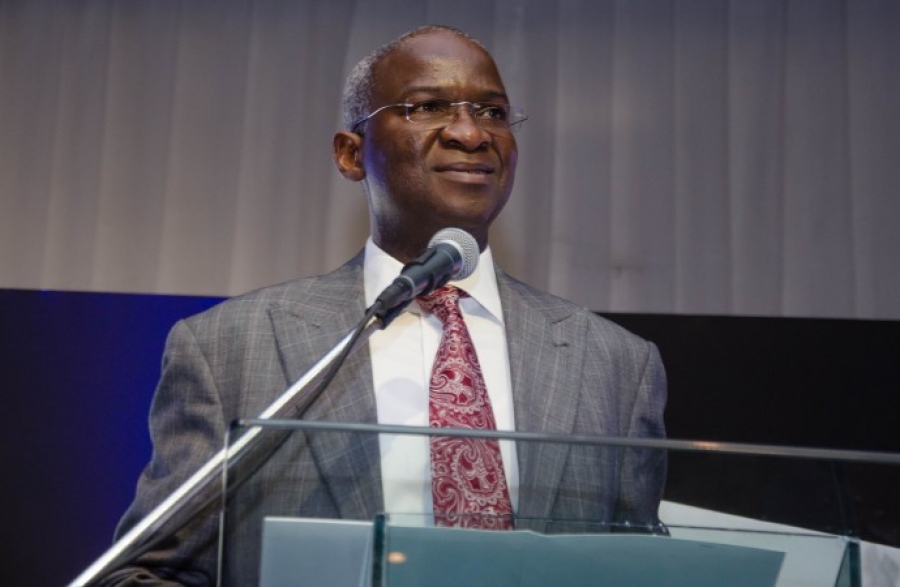Economy
Fashola Raises Hope for Better Electricity Supply
Published
8 years agoon

- Fashola Raises Hope for Better Electricity Supply
The Minister of Power, Works and Housing, Mr. Babatunde Fashola, on Sunday raised hope for improved electricity supply in the country, assuring Nigerians that power generation would ramp up to 4,000 megawatts within the next six days.
The minister spoke on the Sunday Morning Show of Arise Television, asserting that: “In six days’ time, we will restore generation to 4,000MW,” promising: “By the time you have the hydro station back during the raining season, you will get more.”
Nigerians had been experiencing frequent power outages, which worsened in the last few weeks even as the weather became hotter, provoking bitter complaints from citizens.
But the minister, who also clarified that the N701 billion power intervention fund recently announced by the federal government would be spread over the next three years to give comfort to the operators, explained that the outages were due to low water levels at the nation’s hydro power stations.
As a result, he said, power generation had gone down to 3,400MW.
“For the first time in a long time, this is the peak of very hot weather where the waters in the hydro plants are down,” he said.
The problem, he stated, was compounded by the shutting down of two power stations on Saturday, assuring Nigerians, however, that government was determined to average generation at 3,400MW.
“Two of our plants are down; they are trying to evacuate the condensates. We are, however, keeping power generation at about 3,400MW,” he said, expressing hope that with the advent of the rain season and restoration of the hydro stations, generation would be ramped up to 4,000MW.
Fashola charged gas suppliers and generating companies to do more to produce power since the government had firmed its debt payment plan.
Restating the federal government’s commitment to pay debts owed distribution companies by the ministries, departments and agencies (MDAs), he said he would not make a recommendation to government to pay any kobo of tax payers’ money for any debt that was not properly verified.
He said: “For debts, one of the earliest statements I made was that we will pay all the debts once they are verified and the process of verification is taking place. Right now, we are looking at over 250,000 invoices comprising of I think 4,000 accounts. I won’t make a recommendation to government to pay any kobo of tax payers’ money for a debt I cannot put my signature to.
“And so I have a team doing that, we are making good progress and raising questions. That is how debts are going to be settled, we will pay every debt that is owed and verified.”
The minister also spoke on the President Muhammadu Buhari administration’s economic blueprint and said when properly implemented, it would protect Nigeria from future fall in prices of crude oil.
Fashola noted that five out of the 60 interventions plans under the Economic Recovery and Growth Programme (ERGP) launched last week by President Buhari were related to power supply, stressing that with the private sector controlling the power sector, the role of the government now was policy and coordination, and creating enabling business environment for the investors to deliver.
According to him, the government has the responsibility to ensure that the environment is right.
He said the government had promised to deliver 4000MW of electricity, adding that it was on that basis that the tariff was defined.
He, however, added that the government could not achieve that because of vandalism, which according to him, was the business of government and not that of the operators.
He said: “You see the vice-president and the president are trying to restore calm in the Niger Delta and in the last one month there hasn’t been any major announcement of any vandalism. And so we are now in a state of repairs because hitherto what happened was immediately we repaired, they were broken again. I have meetings with all the operators in the sector, we are meeting in Osogbo tomorrow and that is where the National Control Centre is, and that is part of what I am doing to know the asset by name and not just on papers.”
Fashola said the country was beginning to see the need to generate more power with solar energy and also revive coal because all of the other sources of energy were also subject to their own inherent weaknesses.
“When it is raining, solar is not very efficient and that is when you should go to gas. When it is not raining, your hydro is not good and that is where you should be able to go to coal. This is what needs to be done, but I assure you that it would be done, we will get it right,” he said.
Explaining the federal government’s cross-cutting project development that is devoid of party lines sentiments, Fashola stated that Buhari was not playing politics as elections had been won and lost.
He noted that the president was personally driving the biggest power project in Nigeria, the Mambilla Power Project, which is located in Taraba State, a non-APC state.
According to him, the president is driving the conclusion of the negotiations on the back of his visit to China, stressing that the federal government is close to concluding the negotiations and to start work late this year or early next year.
“President Buhari is not playing politics, he is governing, that is the mandate he has now and so are we his ministers,” he said.
Fashola claimed that when he was a governor, the National Economic Council (NEC) meetings did not hold to discuss deep and very important economic issues because the last administration did not want opposition governors to raise certain questions.
“Elections are over, this is the time to govern and that is what we are doing. How could you possibly, if you talk about road, achieve interconnectivity between states? Assuming we are minded like them, you cut off Ekiti State and go and build roads in Ondo State, apart from Imo State in the South-east, essentially we didn’t win any state. But work is going on in those states,” he explained.
He argued that if all the economic programmes planned by the government were efficiently implemented, Nigeria would have enough economic firepower to withstand any new fall in oil prices in the next 10 years.
According to him, the government would through the Economic Recovery and Growth Programme (ERGP), invest in Nigerians and the local economy to begin to internally source for goods and services needed by Nigerians.
He specifically stated that in the government’s housing programme where a number of houses would be built every year on a Public Private Partnership (PPP) scheme, he had mandated that all the building materials required for the projects across the country be internally sourced, except if they were not found within the country.
He said the government had prioritised its programmes for the country’s road network, adding that roads with higher economic values are being worked on.
“As an economic intervention, our plan is to restore the roads, reduce journey times, improve travel experience and reduce the cost of goods and services so that we can move cargoes and goods across Nigeria, and that is beginning to happen. Coming into 2017, I know which roads need priority attention and how to spend the monies we have. We have toured essentially all the six geo-political regions of the country,” he said.
“When I assumed office, about 206 roads already contracted by previous administrations hadn’t been completed,” he added.
“When we started with the 206 roads, the total contract sum was N2.2 trillion and the amount that had been paid was about N700 billion. So, we were out by N1.5 trillion, and I don’t have that budget in my ministry, we had to make choices. The choices we made were based on which roads carried the heaviest traffic so we could make impact, which roads carried Nigeria’s energy need like the fuel cargoes because there must be priorities; which roads sustain lives in terms of delivering food and the food basket of Nigeria is from the Middle Nelt up north, so it is those roads that help Nigerians get on with their lives,” he explained.
On housing, the minister stated that some states had offered to contribute land for the National Housing Scheme, adding that the housing units would be built in larger quantities after the first pilots have been completed.
“We are getting lands from the states; they are choosing the location where I believe they want their housing estates to be located. The housing units must pass through tests of acceptability and affordability for the people that they would be built for, and that was why I alluded to consultations, which we spent the last year doing,” Fashola added.
Is the CEO and Founder of Investors King Limited. He is a seasoned foreign exchange research analyst and a published author on Yahoo Finance, Business Insider, Nasdaq, Entrepreneur.com, Investorplace, and other prominent platforms. With over two decades of experience in global financial markets, Olukoya is well-recognized in the industry.

You may like
-
Nigeria Considers Creation of 31 New States Despite Economic Challenges
-
Visa Denial Sparks Airport Drama as Kenya Airways Defends Staff
-
Nigeria Seeks $15bn Investment to Revamp Power Sector, Offers Higher Tariffs
-
Nigeria’s Economy Shows Signs of Recovery with December PMI at 51.0
-
Nigeria Joins BRICS as Partner Country, Strengthening Global South Cooperation
-
70 Million Poorest of The Poor Nigerians To Get N75,000 From FG















